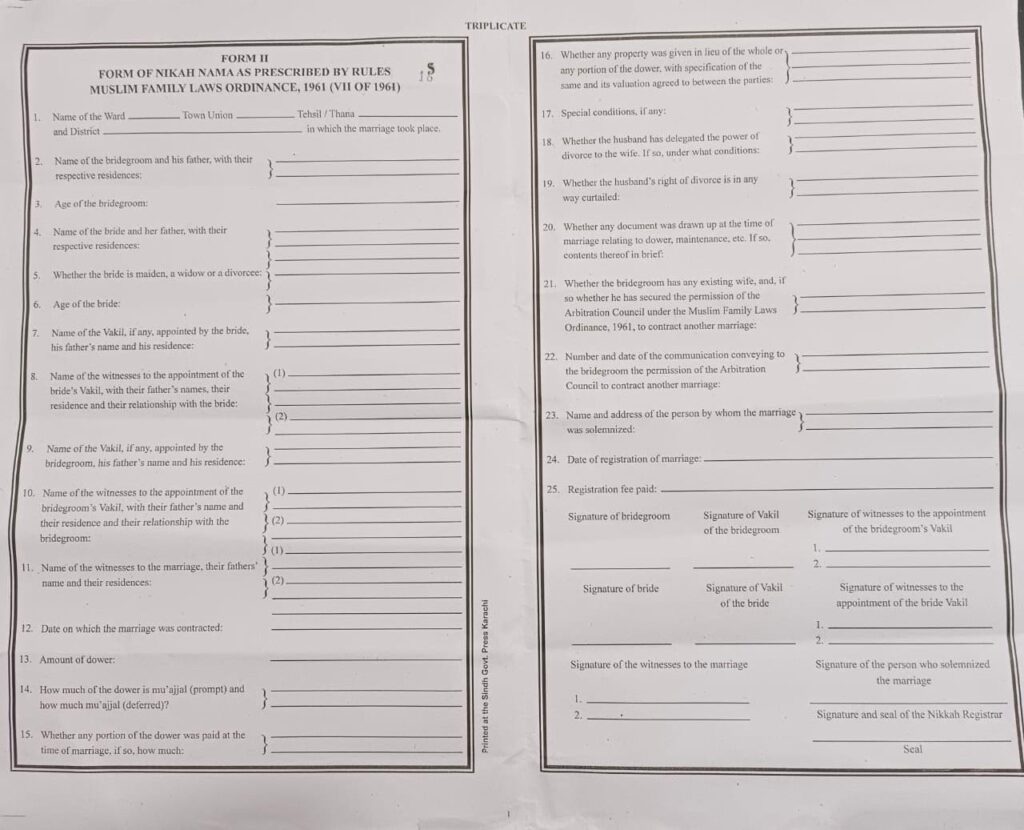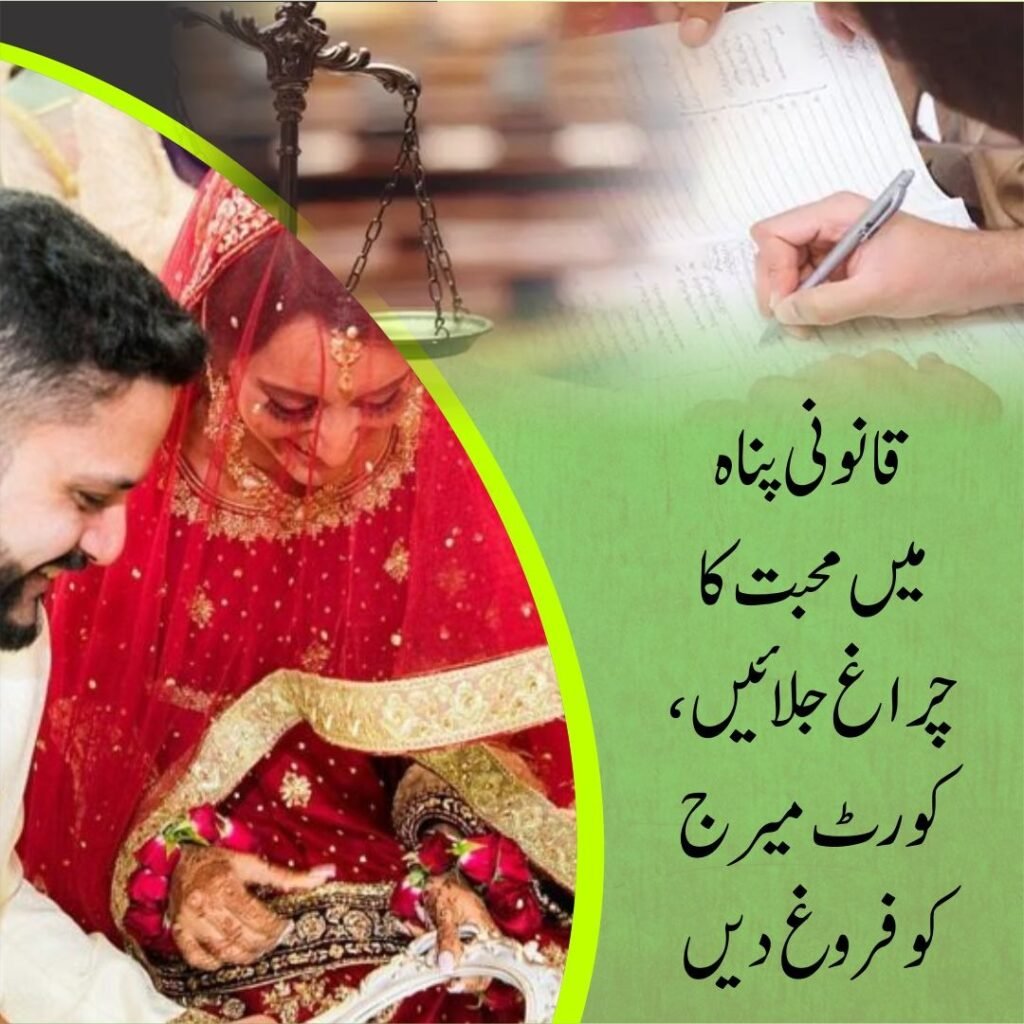Nikah Nama Form | Nikah Nama Form pdf | Pakistani Nikah Nama Download
Get an answer to any query regarding Court Marriage/Civil Marriage!
Nikah Nama Form | Pakistani Nikah Nama Form Pdf Download | Nikah Nama Form is a Contract
Introduction, Importance and Interpretation of Nikah Nama Form
Nikah Nama Form-Pakistan Nikah Nama Form pdf-Nikah Nama Form Download: Pakistani marriage contract is recorded on Nikah Nama Form. Pakistani Nikah Nama form is a marriage contract form. Pakistani Nikah Nama form records marriage every every necessary information of marriage contract.
The Nikah Nama form must be signed by both husband and wife at the time of marriage. Apart from its sanctity in Islam, this document is also fundamental to defining the rights and responsibilities within court of law for both husband and wife.
Nikah (marriage) in Islam is governed by Islamic Shari’a and Nikah (marriage) in Pakistan is legally governed by the Muslim Family Ordinance 1961, which outlines details of the Nikah Nama form for Muslim couples.
In this article, we will elaborate on the different sections of a Nikah Nama form and how they can be used both to provide and protect the rights of both participants.
Pakistani Nikah Nama Form - Importance and Significance of Nikah Nama Form
You should not underestimate this dull-looking, often poorly printed document, as it may well be the most important document you will ever hold in your lifetime. There is no looking back once you sign the dotted line, yet most couples only see the document seconds before they become husband and wife. A Nikah Khawan maulvi, hired to conduct the ceremony, normally fills out the form as he sees fit. Many families leave the actual nikah to the mercy of the maulvi. It is rare for the terms and conditions of the Nikahnama to be considered; couples begin their new lives together unaware of their married rights.
Before Signing Nikah Nama Form, Carefully Examine it
Despite its simplicity, before you sign your Nikah nama form , you should take the time to carefully examine it and analyze it. Knowing the Nikah nama form, can actually help a couple better understand the expectations and responsibilities one has to the other. In order to protect her position in the marriage, it is highly recommended that the bride aligns first stand every detail with her partner. The matter can be protested in court if either party feels that the other party isn’t abiding by the Nikah nama principles at any time during the marriage.
Nikah Nama Form Contains Several Provisions
The Nikah nama form can contain a variety of other provisions. For instance, many couples determine a monetary allowance which the husband must give the wife every month, thereby further securing her financial status. This amount can be challenged by a wife years after the nikah, taking inflation and her growing needs into consideration. Even in the event of a separation or divorce, some couples agree that the husband will continue to pay the wife a monthly salary. As long as the documents abide by the law, additional clauses are acceptable, such as requiring the groom to prove his first wife has permitted him to marry (in the case of polygamy) or deciding on who will get custody of their children if they split up.

Nikah Nama Form is a Vital Document and Requires Serious Consideration
Despite how vital it is, the Nikah nama form is almost always left to the very last minute, when both bride and groom have little time to think about it. So, before you work out the details, it would be best for both potential brides and grooms, as well as their families, to take charge and go over it with a fine-toothed comb. Knowing your rights and asking for what you are entitled to is imperative for you.
Here, we will examine the different clauses of a Nikah Nama form and how they can be filled in so that both parties’ rights are protected and provided for.

Clause 1 to 6 of Nikah Nama Form- Personal Information of the Bride and Groom
Clauses 1-6 give a basic overview of the Nikah nama form. The information includes the address of the ceremony location, the names of the bride and groom, the names of their fathers, their ages and birthdates, addresses and whether the bride is a virgin or widow or divorced.
In terms of indicating the bride and groom’s ages, clauses 3 and 6 of the Nikah Nama Form are crucial.
Pakistan’s child marriage law relies on this clause to determine illegal child marriages. Various laws govern each province, but generally, a bride must be 16 years old, and a groom must be 18 years old for legal marriage. The Sindh province is an exception, where both the bride and groom must be at least 18 years old to be able to marry. Pakistan currently follows the Child Marriage Restraint Act 1929, except for Sindh. It states as follows:
“Child” means a person who, if a male, is under eighteen years of age, and if a female, is under sixteen years of age”.
Although the Sindh Child Marriage Restraint Act, 2013 applies, a child is defined as:
“Child” means a person male or female who is under eighteen years of age”.
Clause 7 to 12 of Nikah Nama Form- Attorney, Witness and Convening of Marriage
In these clauses, the bride and groom list the attorneys they have chosen to represent them, as well as the witnesses. These clauses are related to the witnesses that the couple has appointed to be witnesses to their nikah. According to Islamic tradition, the couple chooses an attorney (Wakil) from each side who conducts the ceremony, verifies the witnesses, and measures the stipulated dowry (if applicable). Also, at least two Muslim witnesses must be trustworthy individuals who are not ascendant or descendant of the bride and groom, such as the parents or grandparents. Names, birthdates, addresses, and national identification card numbers of the three representatives are requested, as well as details about the relationship between the bride and groom and their respective witnesses.
Clause 13 to 17 of Nikah Nama Form- Particulars relating to Haq Mahar (or Haq Mehar/Meher) (Dowry)
These sections specify the amount of the bride’s Haq Mahar (or Haq Mehar/Meher), which is stated in this section. In addition to being a gift a woman receives at the time of her marriage, ‘Haq Mahar (or Haq Mehar/Meher)’ (also known as ‘Dowry’ or ‘Guarantee for Marriage’) also provides her with financial protection in the event of a divorce. Haq Mahar (or Haq Mehar/Meher) is a legal obligation that the groom owes the bride. It can be waived by the bride in her will.
The Haq Mahar (or Haq Mehar/Meher) is a gift that the groom must give to his bride in acknowledgment of their marriage, as one of the most important clauses of the Nikah nama form. In order to avoid miscommunications at the last minute, the two spouses should discuss and finalize the Haq Mahar (or Haq Mehar/Meher) in advance. However, you should be aware of the Haq Mahar (or Haq Mehar/Meher)’s significance and purpose within a wider context. In points 12 – 17, the document describes the type of payment the families have mutually agreed on, which may take the form of cash, gold or any other valuable item. If there is a specified amount of gold, the bride can automatically claim it as her own from the groom. Until the Nikah nama form specifies otherwise, Mehr (or Mehar/Meher) remains a gift to the bride and must be returned to her in the event of a divorce.
Most often, the question of Haq Mahar (or Haq Mehar/Meher) is resolved by the elders, usually the parents of the bride and groom. It is common for parents to refrain from requesting a specific Haq Mahar (or Haq Mehar/Meher) amount and as a result overlook the clauses related to it, without realizing that this can lead to future misunderstandings. Furthermore, left unfilled, these sections could create ambiguity on the husband’s part, leading to the wife taking legal action against him because he has failed to fulfill his duty of the contract. In the case of Haq Mahar (or Haq Mehar/Meher) not appearing in these clauses, the husband must prove in the court of law that the Mehr (or Mehar/Meher) was paid.
Clause 14 of Nikah Nama Form- Details of Haq Mahar (or Haq Mehar/Meher) (Dowry)
Haq Mahar (or Haq Mehar/Meher) is generally paid in cash, real estate, or jewelry of considerable value. Islamic jurisprudence further divides Haq Mahar (or Haq Mehar/Meher) into two parts. A prompt or معجل (Muajjal) Haq Mahar (or Haq Mehar/Meher) is one that is paid upfront at the time of Nikah. A Differed (Mawajal) موجل is the kind of Mahar which is a delayed payment and can be paid in the case of divorce or according to the agreed upon dates or upon the wife’s demand.
We Fight For Your Right
Contact us
Useful links
Clause 15 of Nikah Nama Form– Payments Schedule of Haq Mahar (or Haq Mehar/Meher) (Dowry)
In this clause, it is stated whether a part of the Haq Mahar (or Haq Mehar/Meher) is paid up front and if so, how much in value terms.
Clause 16 of Nikah Nama Form– Allotment of Immovable Property
The purpose of this clause is to determine whether any real estate property was given to the bride as dowry. If so, the value and specifications of the property mentioned here.
Clause 17 of Nikah Nama Form– Supplementary Provisions if Applicable
The clause specifically refers to any special conditions associated with Haq Mahar (or Haq Mehar/Meher).
Clause 18 of Nikah Nama Form– The Right to Divorce
Nikah nama form includes a clause granting the woman the right to divorce her husband. It is unfortunate that in Pakistan they are often cut off at the time of the Nikah without consulting with the bride.
When it comes to this clause, it asks whether the husband has granted his wife the right to divorce and, if so, what are the terms?
Clause 18 of Nikah Nama Form allows a husband to delegate his sole right of divorce to his wife. Having the right protects a woman and gives her an option if her marriage isn’t working. In the event that the related section is left blank, she must go to court and file for a Khula, also known as a judicial divorce or dissolution of marriage.
Note: It should be noted that a woman who is granted the right to divorce her husband will still be able to keep her Haq Mahar (or Haq Mehar/Meher) if she divorces her husband. Should the right to divorce not be granted, the wife must ask the court for Khula. Khula is however granted by the court and is conditional on the wife renouncing her Haq Mahar (or Haq Mehar/Meher) in order to qualify.
Clause 19 of the Nikah Nama Form– Restrictions on Divorce
Clause 19 of the Nikah Nama Form asks if the husband’s right to divorce has been restricted in any way.
Clause 20 of the Nikah Nama Form– Guarantees and Allowances
In clause 20 of the Nikah nama form, the parties are asked if there is an agreement between them regarding the monthly allowance and the guarantees while they are married. In that case, the particulars can be stated.
The section is usually interpreted as an agreement between the wife and her husband over her monthly allowance, but experts suggest that the division of responsibilities and chores among the couple can also be included, paving the way for a woman to pursue her professional career or education. It’s important in the sense that it can help set the tone for a marriage and prevent any future conflict between husband and wife in terms of roles and responsibilities.
Clause 21 and 22 of Nikah Nama Form– Groom’s Marital Status
Among the important sections of the Nikah Nama is this one. This section asks if a groom is already married or if he has another wife. Whether he has taken the permission of his first wife and submitted proofs of her permission to enter into another marriage.
While a second marriage is not annulled according to Islam when the first wife has not given her consent, under the law it is a criminal offense punishable with a fine and jail time.
Clause 23 to 25 of the Nikah Nama Form– Particulars of Parties, Signatures and Registration
This part includes, among other things, the details of the Nikah Khawan, the person who performed the Nikah or solemnized it, the Registrar (official) who registers it, the date of the ceremony and the amount of the Govt. registration fee.
Nikah nama Form also keeps a section for signatures of the bride, groom, witnesses, Nikah Khawan and Nikah Registrar, along with their official seals where applicable. Note: As part of the Muslim Family Law Ordinance 1961, registration of the Nikahnama with the Union Council/Village Council is necessary and then he can obtain a Marriage Registration Certificate (MRC).
Contact Our Family Lawyer/Representative NOW for an Appointment for Court Marriage/Online Marriage
TIMINGS OF OUR COURT MARRIAGE OFFICE:
Court Marriage Office, ISLAMABAD: 10 am to 7 pm
Court Marriage Office KARACHI: 10 am to 7 pm
Court Marriage Office, LAHORE: 9 am to 5 pm
Please contact us through Phone or WhatsApp.
ہمارے نمائندے سے ابھی رابطہ کریں
دفتتر کے اوقات
پیر تا ہفتہ
اسلام آباد: صبح 10 بجے سے شام 6 بجے تک
کراچی: صبح 10 بجے سے شام 7بجے تک
ہماری سہولیات سے مستفید ہونے کو لیے ابھی بذریعہ فون واٹس اپ یا ایمیل رابطہ کریں

